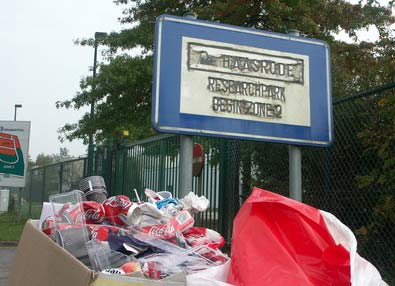De sluikstorters van het ABVV
ABVV-stakers van één bedrijf (InBev) verhinderden niet alleen alle werknemers van de andere 250 bedrijven op het industriepark van Haasrode om te gaan werken, ze lieten ook een hele berg vuilnis achter. Bron: Joris Winters op zijn fotoblog.

Op de website van het extreem-linkse Indymedia Belgium staat een uitgebreid verslag van de vakbondsacties op dit industrieterrein. Je ziet er foto's van een gerechtsdeurwaarder die vaststellingen komt doen. "Bij de dagploeg kwamen er individuele werkwilligen opzetten", schrijft Indymedia, "maar alles is goed verlopen" hiermee wordt wellicht bedoeld: we konden alle werkwilligen terugsturen?) En nog, in ware agitprop-stijl: "Eén van de bedrijfsleiders kwam zelf opdagen, met een deel van zijn werknemers in het kielzog. Na heel wat discussie hebben ze onze argumenten aanvaard en zijn ze weggegaan".



Reacties
Homer Simpson
maandag, 10 oktober, 2005 - 22:43En dan gaan we met z'n allen in onze hangmat liggen. Genietend van de zonsondergang, niet wetend dat de zon morgen in België niet meer zal opgaan.....
Miel
dinsdag, 11 oktober, 2005 - 02:03"hebben ze onze argumenten aanvaard en zijn ze weggegaan"... da's dan uit angst of zelfbehoud veronderstel ik?
MulsP
dinsdag, 11 oktober, 2005 - 08:51Is het "Recht om te staken" groter dan het "Recht om te werken"? Ik denk het niet. Stakers zouden werkwilligen niet mogen hinderen, en zeker niet intimideren. Wat zou er gebeuren als de werkwilligen dezelfde methodes gaan gebruiken en zich ook verenigen en als een georganiseerde groep de stakersposten opzij zetten? Zou de politie dan ook passief blijven toekijken?
Eric Jans
woensdag, 12 oktober, 2005 - 19:53@ Muls P.
"Wat zou er gebeuren als de werkwilligen dezelfde methodes gaan gebruiken en zich ook verenigen en als een georganiseerde groep de stakersposten opzij zetten?"
In Italië gebruikten ze daar in de jaren '20 een bussel takken voor om op stakers in te slaan. Zij gebruikten net als de stakers dus geweld en intimidatie.
Zo'n bussel takken heette een 'face'.
En zij die ermee sloegen ging men 'facisten' noemen.
Let dus op je woorden!
Max Havelaar
dinsdag, 18 oktober, 2005 - 20:52Suez zal geen seconde aarzelen om tewerkstelling naar de Parijse hoofdzetel over te hevelen wanneer ze de 'trots van België' volledig in handen heeft. Waar blijft het vakbondsprotest?
Ik kan niet geloven dat een bedrijf dat uitblinkt in corruptie (o.m. samenwerking met het apartheidsregime), misbruik van zijn monopoliepositie en schendingen van werknemersrechten, zonder slag of stoot het kroonjuweel van een vitale sector als onze energieproductie in handen krijgt.
Het Polaris Instituut biedt in zijn 'Corporate Profile Suez' alvast een smaakmakend overzicht van allerhande inbreuken: http://www.polarisinstitute...
Uiteraard staat op Suez.com een 'Ethisch charter', maar een Franse economieleraar wou een en ander toch even checken. Na volgende uitspraak op Radio France, werd hij door Suez vervolgd:
" "Vivendi basically used a variety of strategic and legal instruments, including bribery. A number of elected officials have said - not just about Vivendi, about Lyonnaise des Eaux and others too - that bribery lies at the heart of those markets. So if bribery is used to enter markets, then the system is not a free-market system... The second thing is that resources are going to be siphoned out of the system as a matter of course. There are instances of overcharging on water-bills. In Avignon, water rates were three francs higher than they should have been. In other instances, companies are going to charge for infrastructure work twice over, when the work was not necessary; they may add considerable management costs and so on. They use water contracts and the whole business of managing water to amass a series of sums of money with which they can expand and invest outside the water business." " (Corporate Profile Suez, p. 22)
Pottenkijkers zijn gewaarschuwd. "Jean Luc Trancart, deputy director general of Suez, told the International Consortium of Investigative Journalists (ICIJ) that "whenever somebody accuses us of corruption, we file a lawsuit for libel!" " (Corporate Profile Suez, p. 22)
En nog dit Indymedia-citaat (om de ontsporingen van het extreme kapitalisme te signaleren, is dit blijkbaar sowieso de enige kritische bron).
"This time, Lyonnaise affirms that Jean-Philippe Joseph's remarks "are an attempt on the company's honour and reputation". They were nothing unusual. They teach us nothing new. For ten years, newspapers articles, verdicts and official reports have repeatedly denounced bribery, overcharging, lack of competition and lack of transparency in the French water market dominated by Lyonnaise, Vivendi and Bouygues. Recently, the Office of Fair Trading ("Conseil de la Concurrence") stipulated that Generale des Eaux (a Vivendi subsidiary) and Lyonnaise must liquidiate their jointly-owned subsidiaires. And though the climate in France may have improved, these corporations' and their subsidiaries' practices are still subject to investigation and trial in the US, in Lesotho, in Peru, in Oman, in Kazakhstan...
So what is behind Lyonnaise' sensitivity?
Lyonnaise des Eaux France is a French subsidiary of ONDEO, the water division of Suez which is the world leader in its sector. It supplies 120 million people and 60,000 industrial clients with water. Large cities and industries: Ondeo has a pretty name but it thrives on pollution.
Historically, the company is linked to the RPR (President Chirac's Gaullist party, dissolved in 2002). Former Lyonnaise Chairman and Managing Director, Jerome Monod, was secretary-general of that party. The company and its subsidiaries have stood at the heart of a number of "affaires" or scandals (the Carignon Affair, the Botton Affair, Maillard and Duclos, the Ile-de-France High School scandal...). The same connection recurs as a central feature in so-called "Françafrique", a web of political networks throughout French-speaking Africa (Morocco, Tunisia, Congo-Brazzaville, Libya, Senegal, Burkina Fasso). And the political connection remains important to this day: Jerome Monod was President Chirac's Special Adviser during the 2002 presidential elections.
He has also been Special Adviser to World Bank Chairman, James Wolfensohn. At the end of the 1980s, when the French market was showing signs of saturation, he began to promote "The French School" in Water Management, a form of public-private partnership (the public sector takes responsibility, the private sector takes the profits). His efforts were successful because French-style privatisation has become the current orthodoxy among international institutions in the field of water management.
So now is not a good moment to remind Gerard Mestrallet, current Suez Chairman, of the world-famous black-marks on the company's record, including charges of bribery, high prices, profits made under the apartheid regime in South Africa and under the Suharto regime in Indonesia, anti-trade union discrimnation in Colombia). Wearing his new Ondeo colours, the new Chairman is launching "The Real Battle for Water" whose battle-cry is "Water for All, Fast!" Never mind that Gerard Mestrallet is quoted as having once said that "water is an efficient product. It is a product that ought to be free and which it is our job to sell". In these times of privatisation, under the auspices of the World Bank, the IMF and the WTO, Ondeo is on a shopping-spree dressed as little red riding-hood.
When Cameroon privatised its water, Lyonnaise's offer was the only one to appear. Out of 103 water-management centres, the corporation was only interested in 6: the most profitable ones, accounting for 95% of turnover. Too bad about the others. Too bad about Cameroonian fears of a price hike. A far cry from "Water for All!" There are other examples. In 1999, the Mayor of Buenos Aires said, "Water prices, which Aguas Argentinas (an Ondeo subsidiary) had said would go down 27% have increased by 20%."
In France, several reports have already shown that where water is privately managed, prices are on average 16% higher. And the outlook is rosy. Since the Doha Ministerial Conference, the WTO has announced a policy of encouraging development. The chase for markets in developing countries is on. Supported by governments and disguised as vegetarians, the ogres are sitting down to eat."
(bron: http://india.indymedia.org/...)
En dan te bedenken dat Electrabel en Tractebel de opvolgers zijn van de 'Algemeene Nederlandsche Maatschappij ter begunstiging van de Volksvlijt', een investeringsbank door Willem I van Oranje in 1822 opgericht. En dat dit bedrijf altijd een visionaire speler is geweest, een technologische vernieuwer met een benijdenswaardige buitenlandse expansie (1880: Russische dochtermaatschappij; in 1905 volgde Latijns-Amerika).
Laat daar geen twijfel over bestaan. Het pronkzuchtige Parijse management zal alle activiteiten in ons land kaalplukken. De buitenlandse expansie van Electrabel/Tractebel werd reeds volledig beknot (zodat Suez die prestigeprojecten zelf kan aanpakken). Denk ook aan de afzetting van Bodson bij Tractebel, de illegale inbraak in het computersysteem om een andere Belgische topman buitenspel te zetten. En dan die zogenaamde garanties op 'Belgische verankering'... een lachertje: zo zou de naam Electrabel blijven bestaan. Tja, je moet wel gek zijn om een goeie merknaam zomaar te wijzigen...